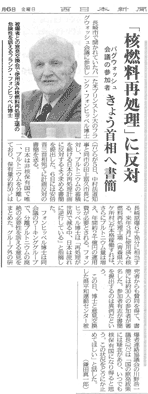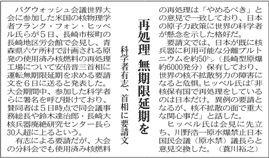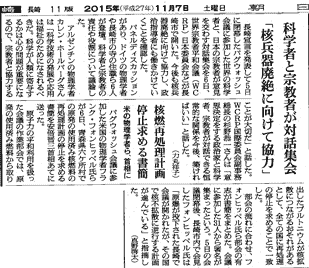長崎市で11月1-5日に開かれたノーベル平和賞受賞団体「科学と国際問題に関するパグウォッシュ会議」に参加した科学者ら31人が6日、安倍晋三首相に日本におけるプルトニウムの分離を無期限に停止するよう要請する書簡を送りました。日本は核兵器6000発分に相当する約48トンものプルトニウムを保有しながら、青森県の六ヶ所再処理工場でさらに使用済み燃料からプルトニウムを取り出そうとしています。
参考
- <核燃料再処理工場>科学者31人が首相に意見書 毎日新聞 11月6日(金)
- 科学者ら再処理中止を首相に要請 プルトニウム消費のめど立たず 共同通信 2015年11月7日
- 海外科学者、日本の核政策批判「コスト高、兵器に転用可」 東京新聞(共同通信 2015年11月4日
- Pugwash scientists demand Japan end troubled nuclear fuel recycling program November 07, 2015
- 2014年末の日本のプルトニウム0.7トン増え、47.8トンに:7月21日の原子力委定例会議で発表──深まる謎 核情報 2015. 7.28
- たまり続ける日本のプルトニウムに募る懸念 原発再稼働で指摘される別の問題 AERA
- 「核燃再処理」に反対 パグウォッシュ会議の参加者きょう首相へ書簡 西日本新聞(右に切り抜き表示)
- 核燃再処理計画停止を求める書簡 2015年11月7日 朝日新聞長崎版(下右に表示)
- 再処理 無期限延期を 科学者有志 首相に要請文 2015年11月6日 長崎新聞(下左に表示)
同じ科学者等は前日の5日には、長崎の中村法道知事と田上富久市長に、「1945年8月9日にプルトニウムを材料とした核爆弾で破壊された市、長崎の政治的指導者」として、「今日、プルトニウムを分離している唯一の非核兵器国」日本が「このような危険な活動を終わらせるよう安倍首相に呼びかけ」て欲しいとする書簡を送りました。
書簡には、パオロ・コッタ・ラムジーノ事務総長、フランチェスコ・カロジェロ前事務総長、パグウォッシュ2015組織委員会鈴木達治郎委員長(長崎大核兵器廃絶研究センター長)、元ホワイトハウス「科学・技術政策局」国家安全保障担当次官のフランク・フォンヒッペル米プリンストン大名誉教授、ヴィクター・ギリンスキー元米原子力規制委員会(NRC)委員など名を連ねています。
以下、書簡原文と日本語訳を掲載します。
安倍首相あての再処理中止要請書簡
6 November 2015
Shinzō Abe, Prime Minister of Japan
Dear Mr. Prime Minister:
We are participants at the 61st Pugwash Conference on Science & World Affairs at Nagasaki on the 70th anniversary of the destruction of the city with a nuclear weapon made with six kilograms of plutonium. We very much appreciate your generous message to the conference.
We also applaud your stressing “our mutual goal of minimizing stocks of … separated plutonium worldwide” in your statement with President Obama at the Nuclear Security Summit held in the Hague in March 2014.
An issue addressed at our meeting is how to make sure that the worldwide development of nuclear energy will be compatible with this mutual goal of ours.
Nuclear energy planners once thought that plutonium would become an economically useful fuel. Economic facts have changed and it is now clear this is not so. Nothing is lost in giving up plutonium use for now and a great deal would be gained in terms of international security.
In 1976 American President Gerald Ford urged the world to put off any use of plutonium as fuel until the world "can cope with the associated risks of proliferation." We think this is still the right approach.
In this connection we would urge Japan to put indefinitely off the planned operation of the Rokkasho plant for extracting plutonium from used nuclear fuel. Also, direct disposal of spent fuel without reprocessing should be allowed in Japan. We recognize that there are strong bureaucratic and regional pressures to operate the plant. But doing so, especially when Japan already has about 50,000 kilograms of separated, weapon-usable plutonium would set an unfortunate example for other countries and so would undermine nonproliferation efforts. It also would force Japan’s electricity consumers to subsidize a "white elephant."
The short to mid-term alternative to reprocessing would be to do what other non-nuclear-weapon states with nuclear power plants and the United States currently do with their older used fuel: store it safely in massive air-cooled casks such as those at the Fukushima-Daiichi plant that went through the accident without raising safety concerns.
Halting Rokkasho's commercial operation would reestablish Japan as a leader in the efforts to strengthen the Nonproliferation Treaty.
With best wishes,
Participants, 61st Pugwash Conference on Science & World Affairs, Nagasaki’s Voice: Remember Your Humanity, 1-5 November 2015, Nagasaki, Japan
Contact: Frank von Hippel, researcher, Program on Science and Global Security, Princeton University, former Assistant Director White House Office of Science and Technology Policy, USA,
Paolo Cotta Ramusino, Pugwash Secretary General
Jeffrey Boutwell, Pugwash, USA
Adele Buckley, Pugwash, Canada
Monte Cassim, Professor and Vice Chancellor Emeritus, Ritsumeikan University, Kyoto
Kevin Clements, Director, National Centre for Peace and Conflict Studies, New Zealand
Francesco Calogero, former Pugwash Secretary General (1989-1997) and Professor of Theoretical Physics (emeritus), University of Rome “La Sapienza,” Italy
Serge Franchoo, Institute for Nuclear Physics and University of Paris-South, France
Victor Gilinsky, physicist, former member U.S. Nuclear Regulatory Commission, USA
Karen Hallberg, Professor, Bariloche Nuclear Center, Argentina
Wataru Iwata, International Symposium on Radiation Protection, Japan
Rebecca Johnson, FRSA, Acronym Institute for Disarmament Diplomacy, member British Pugwash, London, UK
Thomas Jonter, Professor of International Relations, Stockholm University, Chair, Swedish Pugwash, Sweden
Venance Journé, Researcher, National Center for Scientific Research, Paris, France
Jungmin Kang, nuclear scientist, Natural Resources Defense Council, USA
Memduh Karakullukçu, President, Global Relations Forum, Istanbul, Turkey
Paul Meyer, International Panel on Fissile Materials, former Ambassador for Disarmament, Canada
Meghan McGarry, Postdoctoral Fellow, Department of Nuclear Engineering, University of Wisconsin, USA
Keiko Nakamura, Associate Professor, Director, Research Center for Nuclear Weapons Abolition, Nagasaki University
A.H. Nayyar, Professor of Physics emeritus, Quaid i Azam University, Pakistan
Götz Neuneck, Professor of Peace Research and Security Policy, Hamburg University, Germany
Hitoshi Ohnishi, Professor of International Relations, Tohoku University
Zhenqiang Pan, Senior Advisor, China Reform Forum, retired Major General, China
R. Rajaraman, Professor of Physics emeritus, Jawaharlal Nehru University, India
M.V. Ramana, researcher, Program on Science and Global Security, Princeton University, USA
Jennifer Simons, President, Simons Foundation, Vancouver, Canada
Sharon Squassoni, Director, Proliferation Prevention Program, Center for Strategic & International Studies, Washington, DC, USA
Mark Suh, Pugwash Council, Germany and USA
Tatsujiro Suzuki, Director, Research Center for Nuclear Weapons Abolition, Nagasaki University, former Vice Chairman, Japan Atomic Energy Commission
Takao Takahara, Professor, Meiji Gakuin University.
Masafumi Takubo, Director, Kakujoho, Nuclear Information Website
訳文
2015年11月6日
日本国総理大臣 安倍晋三様
総理大臣様
私たちは、6キログラムのプルトニウムを使って作られた核兵器による破壊の70周年の節目に長崎市において開催されている第61回「科学と国際問題に関するパグウォッシュ会議」の参加者です。会議にご丁寧なメッセージをお送り頂いたことに感謝申し上げます。
また、2014年3月にハーグで開催された核セキュリティー・サミットにおけるオバマ大統領との共同声明の中で「世界規模で・・・分離プルトニウムの保有量を最小化するという我々の共通の目標」を強調されたことを私たちは高く評価します。
私たちの会議で議論された一つの問題は、いかにして世界における原子力の発展とこの我々共通の目標とが両立するようにするかというものです。
原子力の計画者等は、かつて、プルトニウムが経済的に役に立つ燃料となるだろうと考えました。しかし、経済的事実は変わり、そうはならないことが明確になっております。プルトニウムの利用を今放棄しても失われるものは何もありません。一方、国際的安全保障の面で得られるものは相当のものとなります。
1976年に米国のジェラルド・フォード大統領は、世界に対し「関連した核拡散リスクについて対処できる」ようになるまでプルトニウムの燃料としての使用を延期するよう呼びかけました。私たちは、これは今も正しいアプローチだと考えます。
この関連で、私たちは、使用済み核燃料からプルトニウムを抽出するために六ヶ所工場を運転する計画を無期限に延期するよう日本に呼びかけたいと思います。また、使用済み燃料を再処理しないでそのまま処分する直接処分を日本で許可する必要があります。この工場を運転するようにという強い官僚主義的な圧力や地方の圧力があることを私たちは理解しています。しかし、運転の開始は、とりわけ、分離済みの核兵器利用可能なプルトニウムをすでに50,000kg(50トン)も日本が保有している状況においては、他の国々に対し不幸な前例を作って示すことになり、核不拡散努力にとって障害となるでしょう。運転開始は、また、日本の電気消費者に対し「無用の長物」に助成金を提供するよう強制することになります。
短・中期的に再処理に代わる道は、原子力発電所を持っている他の非核兵器国と米国が現在その古くなった使用済み燃料について実施していることを実施することです。つまり、巨大な空気冷却キャスクに安全に保管することです。福島第一原子力発電所にあったこのようなキャスクは、あの事故を経験しながら、安全性上の懸念を生じさせていません。
六ヶ所の商業運転を中止することは、核不拡散条約の強化のための取り組みにおける指導者として日本の位置の回復をもたらすことになるでしょう。
敬具
第61回「科学と国際問題に関するパグウォッシュ会議 長崎の声:人間性を心にとどめよ」(2015年11月1-5日 長崎)参加者
連絡先: Frank von Hippel, researcher, Program on Science and Global Security, Princeton University, former Assistant Director White House Office of Science and Technology Policy, USA
Paolo Cotta Ramusino, Pugwash Secretary General
Jeffrey Boutwell, Pugwash, USA
Adele Buckley, Pugwash, Canada
Monte Cassim, Professor and Vice Chancellor Emeritus, Ritsumeikan University, Kyoto
Kevin Clements, Director, National Centre for Peace and Conflict Studies, New Zealand
Francesco Calogero, former Pugwash Secretary General (1989-1997) and Professor of Theoretical Physics (emeritus), University of Rome “La Sapienza,” Italy
Serge Franchoo, Institute for Nuclear Physics and University of Paris-South, France
Victor Gilinsky, physicist, former member U.S. Nuclear Regulatory Commission, USA
Karen Hallberg, Professor, Bariloche Nuclear Center, Argentina
Wataru Iwata, International Symposium on Radiation Protection, Japan
Rebecca Johnson, FRSA, Acronym Institute for Disarmament Diplomacy, member British Pugwash, London, UK
Thomas Jonter, Professor of International Relations, Stockholm University, Chair, Swedish Pugwash, Sweden
Venance Journé, Researcher, National Center for Scientific Research, Paris, France
Jungmin Kang, nuclear scientist, Natural Resources Defense Council, USA
Memduh Karakullukçu, President, Global Relations Forum, Istanbul, Turkey
Paul Meyer, International Panel on Fissile Materials, former Ambassador for Disarmament, Canada
Meghan McGarry, Postdoctoral Fellow, Department of Nuclear Engineering, University of Wisconsin, USA
Keiko Nakamura, Associate Professor, Director, Research Center for Nuclear Weapons Abolition, Nagasaki University
A.H. Nayyar, Professor of Physics emeritus, Quaid i Azam University, Pakistan
Götz Neuneck, Professor of Peace Research and Security Policy, Hamburg University, Germany
Hitoshi Ohnishi, Professor of International Relations, Tohoku University
Zhenqiang Pan, Senior Advisor, China Reform Forum, retired Major General, China
R. Rajaraman, Professor of Physics emeritus, Jawaharlal Nehru University, India
M.V. Ramana, researcher, Program on Science and Global Security, Princeton University, USA
Jennifer Simons, President, Simons Foundation, Vancouver, Canada
Sharon Squassoni, Director, Proliferation Prevention Program, Center for Strategic & International Studies, Washington, DC, USA
Mark Suh, Pugwash Council, Germany and USA
Tatsujiro Suzuki, Director, Research Center for Nuclear Weapons Abolition, Nagasaki University, former Vice Chairman, Japan Atomic Energy Commission
Takao Takahara, Professor, Meiji Gakuin University.
Masafumi Takubo, Director, Kakujoho, Nuclear Information Website
長崎県知事、長崎市長あての要請書簡
6 November 2015
Hōdō Nakamura, Governor, Nagasaki Prefecture
Tomihisa Taue, Mayor of Nagasaki City
Dear Governor Nakamura and Mayor Taue,
Thank you for your welcoming of the Pugwash Conference on Science & World Affairs to Nagasaki.
Please find attached a letter to Prime Minister Shinzō Abe from participants in the Pugwash calling for an indefinite suspension of plutonium separation in Japan.
Japan is the only non-nuclear weapon state that separates plutonium today.
The political leadership of Nagasaki, a city that was destroyed by a plutonium-fueled nuclear explosive on 9 August 1945, has a special standing to express its view on this matter.
We hope that you will join us in pressing Prime Minister Abe to end this dangerous activity in Japan.
With our very best wishes,
Participants, 61st Pugwash Conference on Science & World Affairs, Nagasaki’s Voice: Remember Your Humanity, 1-5 November 2015, Nagasaki, Japan
Contact: Frank von Hippel, researcher, Program on Science and Global Security, Princeton University, former Assistant Director White House Office of Science and Technology Policy, USA, fvhippel@princeton.edu
Paolo Cotta Ramusino, Pugwash Secretary General
Jeffrey Boutwell, Pugwash, USA
Adele Buckley, Pugwash, Canada
Monte Cassim, Professor and Vice Chancellor Emeritus, Ritsumeikan University, Kyoto, Japan
Kevin Clements, Director, National Centre for Peace and Conflict Studies, New Zealand
Francesco Calogero, former Pugwash Secretary General (1989-1997) and Professor of Theoretical Physics (emeritus), University of Rome “La Sapienza,” Italy
Serge Franchoo, Institute for Nuclear Physics and University of Paris-South, France
Victor Gilinsky, physicist, former member U.S. Nuclear Regulatory Commission, USA
Karen Hallberg, Professor, Bariloche Nuclear Center, Argentina
Wataru Iwata, International Symposium on Radiation Protection, Japan
Rebecca Johnson, Director, FRSA, Acronym Institute for Disarmament Diplomacy, member British Pugwash, London, UK
Thomas Jonter, Professor of International Relations, Stockholm University and Chair, Swedish Pugwash, Sweden
Venance Journé, Researcher, National Center for Scientific Research, Paris, France
Jungmin Kang, nuclear scientist, Natural Resources Defense Council
Memduh Karakullukçu, President, Global Relations Forum, Istanbul, Turkey
Meghan McGarry, Postdoctoral Fellow, Department of Nuclear Engineering, University of Wisconsin, USA
Paul Meyer, International Panel on Fissile Materials, former Ambassador for Disarmament, Canada
Keiko Nakamura, Associate Professor, Director, Research Center for Nuclear Weapons Abolition, Nagasaki University
A.H. Nayyar, Professor of Physics emeritus, Quaid i Azam University, Pakistan
Götz Neuneck, Professor of Peace Research and Security Policy, Hamburg University, Germany
Hitoshi Ohnishi, Professor of International Relations, Tohoku University
Zhenqiang Pan, Senior Advisor, China Reform Forum, retired Major General, China
R. Rajaraman, Professor of Physics emeritus, Jawaharlal Nehru University, India
M.V. Ramana, researcher, Program on Science and Global Security, Princeton University, USA
Jennifer Simons, President, Simons Foundation, Vancouver, Canada
Sharon Squassoni, Director, Proliferation Prevention Program, Center for Strategic & International Studies, Washington, DC, USA
Mark Suh, Pugwash Council, Germany and South Korea
Tatsujiro Suzuki, Director, Research Center for Nuclear Weapons Abolition, Nagasaki University, former Vice Chairman, Japan Atomic Energy Commission
Takao Takahara, Professor, Meiji Gakuin University
Masafumi Takubo, Director, Kakujoho, Nuclear Information Website
訳文
2015年11月5日
長崎県知事 中村法道様
長崎市長 田上富久様
中村知事様、田上市長様
「科学と国際問題に関するパグウォッシュ会議」開催を歓迎して頂きありがとうございます。
添付させて頂いたのは、パグウォッシュ会議の参加者の一部から安倍晋三首相に宛てた書簡で、日本におけるプルトニウムの分離を無期限に停止するよう要請するものです。
日本は、今日、プルトニウムを分離している唯一の非核兵器国です。
1945年8月9日にプルトニウムを材料とした核爆弾で破壊された市、長崎の政治的指導者は、この問題について見解を表明する点で特別な地位にあります。
私たちとともに、日本におけるこのような危険な活動を終わらせるよう安倍首相に呼びかけて頂くようお二人にお願い申し上げます。
敬具
第61回「科学と国際問題に関するパグウォッシュ会議 長崎の声:人間性を心にとどめよ」参加者
以下署名:


